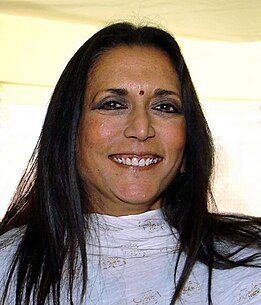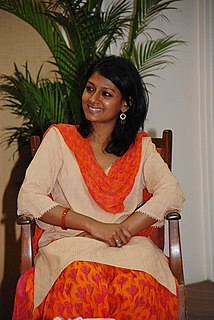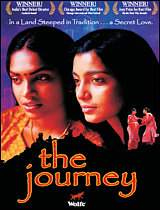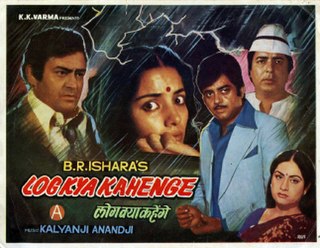
Shabana Azmi is an Indian actress of film, television and theatre. The daughter of poet Kaifi Azmi and stage actress Shaukat Azmi, she is an alumna of Film and Television Institute of India of Pune. Azmi made her film debut in 1974 and soon became one of the leading actresses of Parallel cinema, a new-wave movement known for its serious content and neorealism and received government patronage during the times. Regarded as one of the finest actresses in India, Azmi's performances in films in a variety of genres have generally earned her praise and awards, which include a record of five wins of the National Film Award for Best Actress and several international honours. She has also received five Filmfare Awards, and was honoured among "women in cinema" at the 30th International Film Festival of India. In 1988, the Government of India awarded her with Padma Shri, the fourth highest civilian honour of the country.
Hindu views of homosexuality, and LGBT issues more generally, are diverse and different Hindu groups have distinct views. Although Hindu texts such as the Manusmriti, Vide Atri Smřti, Vide Baudhāyana Dharmasūtra, and the Vide Apastambha Dharmasūtra treat homosexuality as a sin, in some cases legally punishable, a number of Hindu texts have portrayed homosexuality as a joyful possible expression of human sexuality, the Kamasutra affirms and recognizes same-sex relations, and there are several Hindu temples which have carvings that depict both men and women engaging in homosexual acts. There are also some Hindu deities that are shown to be falling on the LGBT spectrum.

Deepa Mehta, is an Indo-Canadian film director and screenwriter, best known for her Elements Trilogy, Fire (1996), Earth (1998), and Water (2005).

Fire is a 1996 Indo-Canadian erotic romantic drama film written and directed by Deepa Mehta, starring Shabana Azmi and Nandita Das. It is the first installment of Mehta's Elements trilogy; it is succeeded by Earth (1998) and Water (2005).

Earth is a 1999 Indian period romance drama film directed by Deepa Mehta. It is based upon Bapsi Sidhwa's novel, Cracking India, set during the 1947 partition of India. Earth is the second installment of Mehta's Elements trilogy, preceded by Fire (1996) and followed by Water (2005). It was India's entry for the 1999 Academy Award for Best Foreign Language Film.

Water is a 2005 drama film written and directed by Deepa Mehta, with screenplay by Anurag Kashyap. It is set in 1938 and explores the lives of widows at an ashram in Varanasi, India. The film is also the third and final instalment of Mehta's Elements trilogy. It was preceded by Fire (1996) and Earth (1998). Author Bapsi Sidhwa wrote the 2006 novel based upon the film, Water: A Novel, published by Milkweed Press. Sidhwa's earlier novel, Cracking India was the basis for Earth, the second film in the trilogy. Water is a dark introspect into the tales of rural Indian widows in the 1940s and covers controversial subjects such as misogyny and ostracism. The film premiered at the 2005 Toronto International Film Festival, where it was honoured with the Opening Night Gala, and was released across Canada in November of that year. It was first released in India on 9 March 2007.

Nandita Das is an Indian actor and director. She has acted in over 40 feature films in ten different languages. Das won accolades for numerous performances, including in Fire (1996), Earth (1998), Bawandar (2000), Kannathil Muthamittal (2002), Azhagi (2002),Kamli (2006), and Before The Rains (2007). Her directorial debut Firaaq (2008), premiered at the Toronto Film Festival and traveled to more than 50 festivals, winning more than 20 awards. Her second film as a director was Manto (2018). Based on the life of 20th Century Indo-Pakistani short story writer Sadat Hasan Manto, the film was screened at Cannes Film Festival in the "Un Certain Regard" section. In September 2019, Das produced a two-minute Public Service Announcement music video India's Got Colour. The music video is about the issue of colourism and urges the audience to celebrate India's diversity of skin colour. Her first book was 'Manto & I' chronicles her 6-year long journey of making the film. She wrote, directed, produced and acted in a short film called, Listen to Her, that sheds light on the increase in domestic violence and overburden of work that women have been facing during the lockdown.

The Journey is a 2004 Malayalam language feature film written, directed and produced by Ligy J. Pullappally, inspired both by her short film Uli and a true story of two lesbian lovers in the South Indian state of Kerala.
The Elements trilogy is a trilogy of films by Indian film-maker Deepa Mehta, dealing with controversial issues of social reform on the Indian subcontinent. Fire, the first release in 1996, dealt with issues of arranged marriage and homosexuality in the patriarchal culture of India. Earth, released in 1998, dealt with the religious strife associated with the partition of India and formation of Pakistan in the mid-20th century. Water, released in 2005, was the most critically successful of the three, and dealt with suicide, misogyny, and the mistreatment of widows in rural India.
Hari-Bhari (Fertility) is a 2000 Hindi film by Shyam Benegal, starring Shabana Azmi, Rajit Kapur, Rajeshwari Sachdev, Surekha Sikri and Nandita Das in the lead roles.
Hare Krishna views of homosexuality, and especially the view of the International Society for Krishna Consciousness (ISKCON) towards LGBT issues, are similar to their views of heterosexual relationships, i.e. because the living entity is identifying with the body, any attraction based on the desire to gratify the body and its senses is symptomatic of illusion and can be purified by progressively elevating the consciousness. Put simply, both hetero- and homosexual attraction is due to an illusory attachment to the temporary body. Same-sex relations and gender variance have been represented within Hinduism from Vedic times through to the present day, in rituals, law books, mythical narratives, commentaries, paintings, and sculpture. The extent to which these representations embrace or reject homosexuality has been disputed within the religion as well as outside of it.

Albert Pinto Ko Gussa Kyoon Aata Hai is a 1980 Bollywood film directed by Saeed Akhtar Mirza based on his own story. The film starred Naseeruddin Shah, Shabana Azmi and Smita Patil as leads.

Midnight's Children is a 2012 Canadian-British film adaptation of Salman Rushdie's 1981 novel of the same name. The film features an ensemble cast of Satya Bhabha, Shriya Saran, Siddharth Narayan, Ronit Roy, Anupam Kher, Shabana Azmi, Kulbhushan Kharbanda, Seema Biswas, Shahana Goswami, Samrat Chakrabarti, Rahul Bose, Soha Ali Khan, Anita Majumdar and Darsheel Safary. With a screenplay by Rushdie and directed by Deepa Mehta, the film began principal photography in Colombo, Sri Lanka in February 2011 and wrapped in May 2011. Shooting was kept a secret as Mehta feared protests by Islamic fundamentalist groups.

Freaky Chakra is a 2003 Bollywood comedy-drama film directed by V. K. Prakash and Ziba Bhagwagar. The film stars Deepti Naval and Sachin Khedekar. The film was India's official entry for Toronto Reel Asian International Film Festival, and received recognition by the International Federation of Film Critics at the 2003 Mumbai International Film Festival.

India has a limited culture for LGBTQIA people due to widespread homophobia, stemming from colonial implementation of European law, in the modern-day populace. However living conditions and media representation have been improving in recent years, especially in terms of representation of transgender people.

Log Kya Kahenge is a 1982 Indian Hindi-language film produced and directed by B. R. Ishara. It stars Shabana Azmi, Shatrughan Sinha and Sanjeev Kumar in pivotal roles and also features Navin Nischol. The title of the film, "Log Kya Kahenge", is documented as a common stigma facing women in Indian society who challenge pre-arranged marriages and are expected to behave in a certain manner. The film deals with themes of murder and adultery.
The modern South Korean LGBT rights movement arose in the 1990s, with several small organizations seeking to combat sexual orientation and gender identity discrimination.
"Lihaaf" is a 1942 Urdu short story written by Ismat Chughtai. Published in the Urdu literary journal Adab-i-Latif, it led to much controversy, uproar and an obscenity trial, where Ismat had to defend herself in the Lahore Court as well for this work. She was asked to apologize which she did not and also won the case, after her lawyer pointed out that the story makes no suggestion to a sexual act, and prosecution witnesses could not point out any obscene words, and the story is suggestive and told from perspective of a small girl.
This is a timeline of notable events in the history of non-heterosexual conforming people of South Asian ancestry, who may identify as LGBTIQGNC, men who have sex with men, or related culturally-specific identities such as Hijra, Aravani, Thirunangaigal, Khwajasara, Kothi, Thirunambigal, Jogappa, Jogatha, or Shiva Shakti. The recorded history traces back at least two millennia.
Manav Kaul is an Indian theatre director, playwright, author, actor and filmmaker. He was nominated for the Filmfare Award for Best Supporting Actor for his role in the film Tumhari Sulu (2017).












